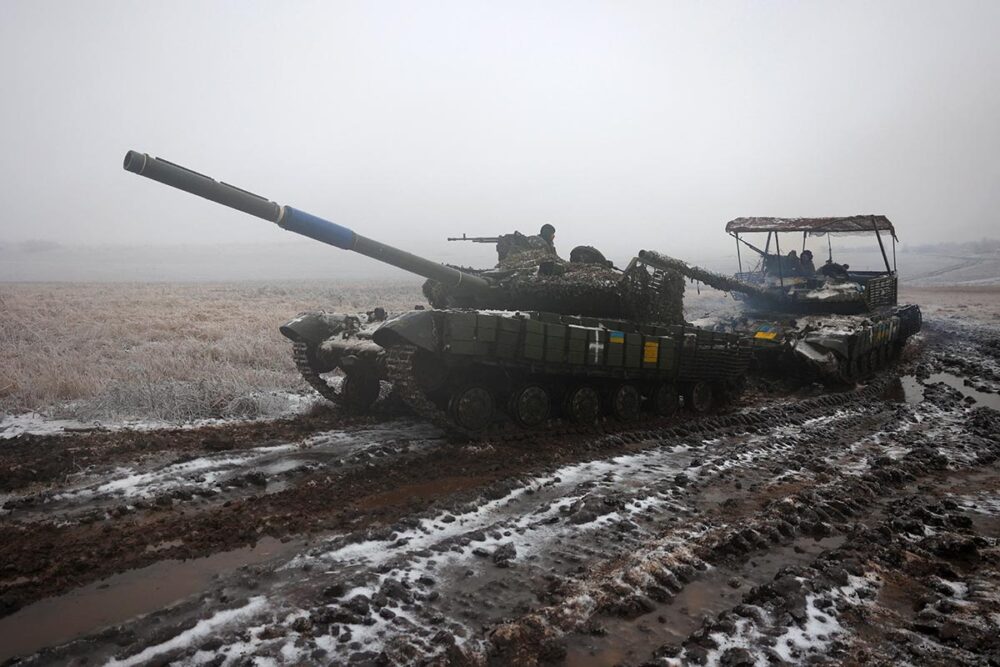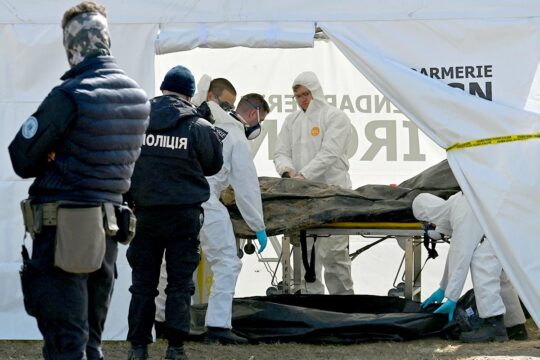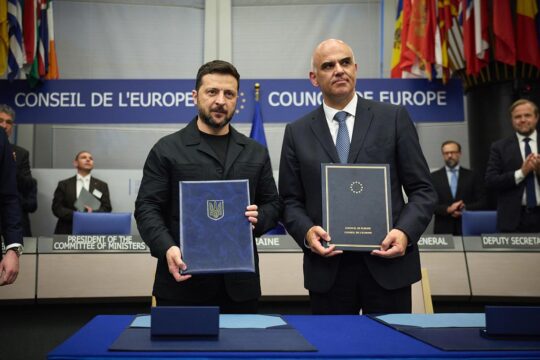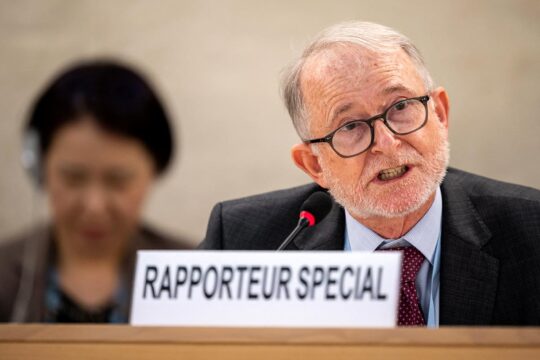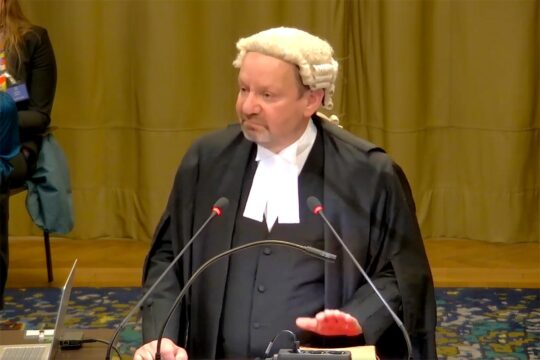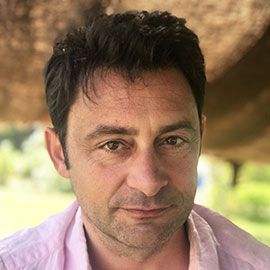JUSTICE INFO: A year ago, you told us "the fate of justice in Ukraine depends on the outcome of the fighting". What has become of this prediction, and what does the stalemate in the war mean for justice now?
FRÉDÉRIC MÉGRET: I think the stalemate in the war, which is quite obvious, is also translating into a stalemate in justice initiatives for Ukraine. To some extent, there's a correlation between the two, i.e., everyone realizes that justice is only likely to be achieved in the context of a Ukrainian victory or regime change in Russia. The further away these things seem, the greater the risk of investing too much in international criminal justice, at a time when it's hard to see how it can be achieved.
Justice remains an important springboard for Ukrainian foreign policy, in terms of legitimacy and to make clear that Ukraine is the aggressed party. But I'm tempted to say that Ukraine and the international community have other fish to fry at the moment. Added to this is the fact that some states have always been ambivalent about any justice effort, including Ukraine's primary supporter the United States, which is perhaps a little fearful of a possible precedent for aggression. If, for example, there were to be an international criminal tribunal, that might one day turn against the Americans. There have been a lot of technical debates around this issue, but it's a bit of a distraction. The conditions are simply not ripe for this to go ahead.
We see that the momentum created by Ukraine at the start of the war has slowed down on the international judicial scene. Even at national level, there are hardly any trials of Russian soldiers any more. Has the judicial battle been set aside?
I don't think so. I think the prosecutors are doing a good job in Ukraine. Other cases may be opened. The fact is that we now have a front line that moves little, where we have fewer incidents like Bucha with soldiers arriving in Ukrainian towns in situations that lend themselves to the commission of massacres or large-scale war crimes against civilians. We're seeing a shift towards a more conventional war that revolves around urban centres but where civilians have largely been evacuated. This may mean fewer war crimes being committed, and fewer opportunities to capture Russian soldiers suspected of crimes.
When it comes to more systemic investigations like environmental crimes or bombing civilian infrastructure, whether in Ukraine or at the International Criminal Court (ICC), isn't it very difficult to move from the symbolic to the more concrete?
Yes, and the problem is also getting the culprits. The whole point of prosecutions of this kind is to go up the chain of command to the people most responsible. And we simply don't have the people responsible. We must not underestimate the extent to which these investigations and efforts are, despite everything, part of a long-term perspective, and that time is not on the side of Russian officers or politicians who may have condoned the commission of war crimes or crimes against humanity. We saw this with the tribunal for the former Yugoslavia, which waited a long time before bringing Karadzic, Mladic and Milosevic to justice. The wheels of justice turn slowly, and there's a logic to building a case. We can see this with the mechanism created in The Hague as part of Eurojust, which enables prosecutors to compile a sort of grand dossier on aggression that could one day be deployed against Putin and others. This is similar to the process of investigation into Syria, which does not lead to trials but has the merit of existing.
For Ukraine, we were nevertheless expecting quicker results...
Yes, but international justice has always been a disappointment in this respect, and we'll never cease to emphasize that we mustn't expect an immediate, magical response that would put an end to the commission of crimes in one fell swoop. As you know, [Ukrainian] President Zelensky wants an international tribunal, while certain states support the creation of a hybrid tribunal that would be part of the Ukrainian legal system, but with the assistance of international judges. In any case, from a legal point of view, there remains one major problem: no one has yet found a convincing argument, in my opinion, to justify overriding the immunities of [Russian] President Putin, at least as long as he is in office. It's a question that divides international jurists.
A year ago, we thought we were nearing a conclusion for this aggression tribunal. What's holding things up in the end, legal or political considerations?
Of course, it's the politics. But nobody wants to invest hundreds of millions of dollars in a project that, legally speaking, doesn't hold water and won't be able to deliver on its promises. I'll use an analogy: creating the Nuremberg Tribunal in 1941 wouldn't have made much sense; it needed to wait for the outcome of the conflict, on which everything ultimately depended. It's what the Allies did during the Second World War, although they began meeting very early on to discuss ways of prosecuting the great Nazi criminals. Nobody wants to support an empty shell incapable of taking action.
And let's not forget that the ICC, whose performance we can criticize, is still active. There's an arrest warrant out for Putin, which is no mean feat. Of course, it's for a crime that is not on the scale of aggression and which, while serious - the abduction of children as a war crime -, is not at the heart of what Putin can be accused of. I think the reasoning [of the states] is that if we can't judge this crime, which clearly falls within the jurisdiction of the ICC and which he clearly committed a priori, there's no point in looking into this question of aggression, over which the ICC has no jurisdiction. What's more, the states of the "Global South" object strongly to the idea that the West would set up an ad hoc tribunal just to try Putin. This brings us face to face with the historical contradictions of international criminal justice, a project which, in principle, has considerable merit but which in practice depends very much on the political will of individual states.
Isn't it this geopolitical divide that is most blocking within the UN General Assembly creation of an aggression tribunal?
Absolutely. It's the weight of majorities. There is indeed a real division, sometimes a little difficult to understand. The states of the global South have just as much interest as the Europeans in ensuring that there is no revival of great powers attacking neighbouring states and violating their sovereignty. There are no greater defenders of state sovereignty as embodied in the United Nations Charter than many states in the Global South. In addition, the fact that certain states practice client politics towards Russia can be explained and is understandable. Finally, behind all this there is a rejection of the West, a rejection of the international criminal justice project which is based on universal values but has had a certain tendency to turn against African states. International criminal justice is a little dated. It rose in the 1990s and in the 20th century before 9/11, before the pandemic, before the emergence of the BRICS, before all kinds of major international developments.
Let's return to the International Court of Justice (ICJ). Didn't Ukraine score a sort of own goal there?
Yes. Ukraine wanted to put Russia on trial, saying that Russia had improperly invoked the commission of genocide to justify its invasion. The ICJ found this a bit far-fetched. It said: I'm not going to go that far, I understand that this question of use of force is not directly linked to the Genocide Convention. We can disagree, but that's what the Court essentially said. On the other hand, it is now saying that it will consider whether or not Ukraine has committed genocide in the Donbass. It's safe to assume that, in the long run, Ukraine is likely to win this case. But today, the irony is that it’s Ukraine defending itself against accusations of genocide, not Russia.
It's also a warning to others. Even in relation to South Africa versus Israel, you have to be careful, because if you take a case like this and lose it, in a way you're in a worse situation than if you'd done nothing. Today, Russia is sniggering: the Ukrainians didn't get what they wanted and, in the end, the spotlight is shining on them in a way that's a little unfair and unfortunate in terms of their strategy. Losing or only half winning this kind of case doesn't present you in the best light.
In Russia, trials of Ukrainians have been underway since last spring, most of them against soldiers. How do you see this?
I think it corresponds to a very clear propaganda exercise: if you accuse us, we'll do the same. It's a logic of tit-for-tat, reversing the roles to say that what you're doing is much worse than what you're accusing Russia of.
Some of these prosecutions are, moreover, somewhat poorly documented and based on rather dubious procedures. They say they are going to accuse Ukrainians of terrorism, but that's an accusation that really has no place in the case of an international armed conflict. Whatever the political affiliation of Azov Battalion members, they are part of the Ukrainian chain of command, so they are combatants. It would be a little different if they had actually terrorized civilian populations, but that's not the case: they were fighting on Ukrainian territory. The accusations are therefore somewhat opportunistic, aimed above all at discrediting Ukrainian resistance and self-defence by painting it as part of a fascist ideology dating back to the Second World War. It's all about turning back the clock, manipulating the law to obtain tailor-made judgments that fit the Russian government's narrative.
Ukraine was a surprise on the legal front at the very beginning. What surprises might we expect now?
What might come as a surprise at some point is trials based on universal jurisdiction, i.e. of Russians who end up in Europe. We've seen this with Syria, for example. It's too early to say whether we'll see any examples with Russia. We have the phenomenon of deserters, with a rather hostile attitude on the part of European states that are not necessarily inclined to welcome them. We do know, however, that one of the causes of dissidence, as was the case with Chechnya, is dissatisfaction with conscription, linked of course to the "body bags" returning to remote corners of Russia. This is quite different from the liberal opposition in Moscow.
We still see the crime of aggression as a crime against the other, against the aggressed state. But it's also a crime against one's own population, in the sense that you're going to deliver hundreds of thousands of men to almost certain death in order to wage a completely illegal war. It's a far cry from the mutinies of 1917, but it's a potential weakness.
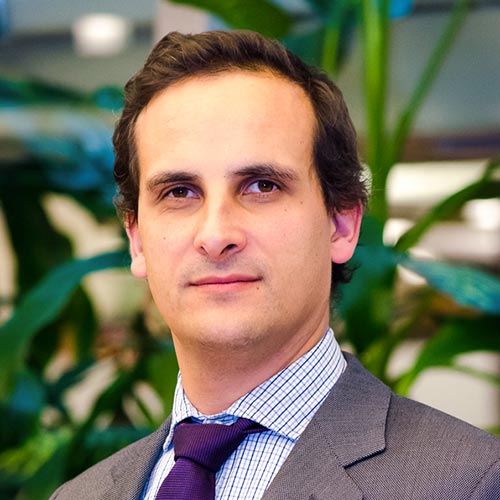
Frédéric Mégret is a professor and co-director of the William Dawson Chair in Human Rights and Legal Pluralism at McGill University in Canada. He is a specialist on international criminal justice, international humanitarian law, international organizations and transitional justice.


